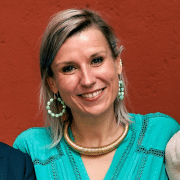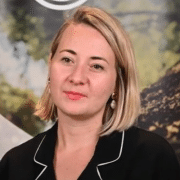Embedding a gender lens into climate innovation
In The News
18 Apr 2024
Your organisation has decided to tackle gender inequality – now what?
Inequality in the male-dominated climate innovation world remains present, despite studies showing that women*-led firms have higher ESG (Environmental, Social, Governance) scores. In addition, businesses with a higher share of women in leadership positions are more likely to adopt environmentally friendly practices and women-led ventures generate more revenue.
So, how to put gender considerations into practice in all aspects of an organisation? Examining where you are and where you want to be on the issue of gender equality in your organisation will help you identify gaps and create actions based on needs specific to your work.
EIT Climate-KIC recently outlined five actions to address gender inequity in climate entrepreneurship – and this article expands on the first action, reflect internally. We talked to Lotte-Marie Brouwer, from Bopinc, Manuela Boma-Atta, from I&P and Wallis Grant from EIT Climate-KIC to learn more.
-

-
Lotte-Marie Brouwer
-

-
Manuela Boma-Atta
-

-
Wallis Grant
Barriers and opportunities
Many organisations are willing to work on gender and diversity but often cite a lack of resources or time as a reason for not being able to do more. Our partner Lotte-Marie Brouwer, Gender and diversity lead at NGO Bopinc says, “Many companies worry that work on gender and diversity will distract them from their core business operations.”
Helping organisations design commercially and socially viable business models, Brouwer believes that once companies realise that gender mainstreaming can be put into practice, it can help solve some of their key struggles. By gender mainstreaming, we mean the integration of gender considerations into all aspects of an organisation: operations, policies, programmes, and practices. “Are you serving women as one of the most powerful customer segments, are you leveraging the potential of women as micro-entrepreneurs, are you struggling to retain some of your best women employees? For me, gender mainstreaming goes beyond hitting the right percentage targets – it is about understanding the unique needs and wants of different people and serving them the best way possible. Ultimately, this will not only benefit them but also your business,” says Brouwer.
Main gender inequity issues
Companies should strive to build an equitable approach to gender mainstreaming across the organisation. Systemic and implicit bias can impact decisions at the candidate-seeking stage, leading to gender inequity before women are even hired. Inflexible hours for interviews – as well as proposed work schedules – can also disadvantage women, making recruitment processes inaccessible. With studies showing that women often negotiate their salaries downwards, it is also important for companies to show salaries on job descriptions and consider the gender gap in salary negotiations.
Our partner Manuela Boma-Atta is ESG and Impact Officer at pioneering impact investment group I&P. Working with companies in Ghana, Ivory Coast and Senegal to enhance their level of gender equity, Boma-Atta sees education inequality impacting the workforce: “We want to increase women leaders in our institutions as well as operational and financial teams. However, as girls are disadvantaged in education it can be difficult to recruit the right profiles.”
Tools and approaches for mainstreaming
Once challenges and areas for improvement have been identified, organisations can use a range of tools to begin addressing gender inequity.
Investing in unconscious bias training tackles issues of inequality related to gender – as well as other demographic groups. Boma-Atta believes rolling out training will allow an organisation to reflect and potentially lead to integrated change across an organisation: “There are gender biases in investment and women have less access to capital, so we need to raise awareness from the moment we recruit someone – and training is key.”
Young women also need to see women leaders in action, says Boma-Atta: “Hiring women candidates for internships and junior positions is one way to get women involved in companies at the beginning of their career. We encourage companies to take women leaders with them to universities so students can see what is possible.”
Brouwer adds that it is important to engage with employees: “If the women in your workforce are feeling disadvantaged, a company will never be as great as it can be. Understand how socio-cultural, economic and environmental factors are influencing their experience of personal and professional development. Co-create policies and solutions, test them, reiterate until you get it right,” she says.
Take action on being gender-smart
At EIT Climate-KIC, we have been focusing on gender inequality as part of our journey to boost Diversity, Equity & Inclusion (DE&I). We have undertaken gender bias training and created an action plan which focuses on both our internal organisation and external project-based work.
Our Gender Programme Manager, Wallis Grant, reflects: “Beginning with gender bias training allowed us to connect to the topic on a personal level, reflecting on our own connection to gender inequity and hearing about our colleagues’ experiences. This helped a lot with motivation to work on concrete actions as people could feel the importance this work has on everyday life.”
We have gathered some useful tips to get your organisation started when it’s at the beginning of its journey to become gender smart.
- Choose a key issue which you can integrate into a business plan e.g. hiring more women, focus on more women in leadership or working with more women funders.
- Prioritise unconscious bias training.
- Reflect how to bring men on board, as they have a critical role to play as advocates and supporters.
- Allocate adequate budget and resources to avoid the topic being deprioritised – and keep in mind that changes do not happen overnight, be ambitious but realistic.
- Consult existing resources – if you are an entrepreneurship support organisation (ESO) interested in gender mainstreaming, you can download our WeClim Equally Handbook here. Another useful resource is the WeRise Toolkit for Entrepreneurs by UN Women.
*In the context of this article, the term ‘women’ encompasses women and minority-genders.
At EIT Climate-KIC, we’re committed to driving systemic change in gender equity across the climate innovation sector. Our programme, supported by Irish Aid, CATAL1.5°T, IDB Lab and Salesforce, helps partners identify gaps in their understanding of gender inequity and implement concrete actions for organisations to embed a gender lens into their everyday work.
Learn more about EIT Climate-KIC gender work here.




